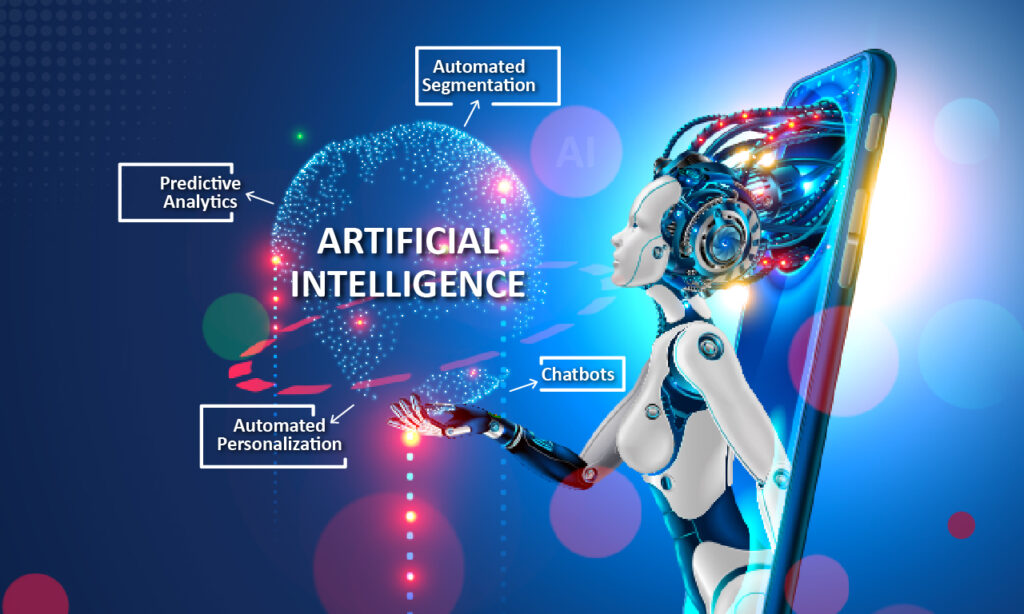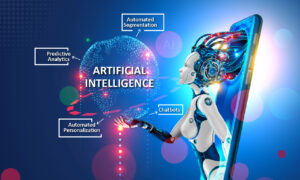The digital marketing landscape is in constant flux, and at the forefront of this evolution lies the transformative power of Artificial Intelligence (AI). While AI has permeated various aspects of marketing, its impact on email marketing is proving to be particularly profound, reshaping how businesses connect with their audiences, personalize their messaging, automate their workflows, and ultimately drive conversions. In 2025 and looking towards the horizon, AI is no longer a futuristic concept in email marketing; it is rapidly becoming the engine that powers sophisticated and highly effective campaigns.

This extensive exploration will delve into the myriad ways AI is changing the future of email marketing, examining current trends and projecting the significant advancements we can expect to see in the coming years. From hyper-personalization and intelligent automation to enhanced deliverability and insightful analytics, we will uncover how AI is empowering marketers to create more meaningful and impactful email experiences. Furthermore, we will address the ethical considerations that arise with the increasing use of AI and explore the evolving role of human marketers in this algorithmically driven landscape.
I. The Dawn of the Intelligent Inbox: AI-Driven Trends Shaping the Future of Email Marketing
The integration of AI into email marketing is not a singular event but rather a confluence of evolving trends that are fundamentally altering the way businesses approach this crucial communication channel. Several key trends are already apparent in 2025 and are poised to accelerate in the years ahead:
1. Hyper-Personalization at Scale: Moving Beyond Basic Data Points
Personalization in email marketing is no longer a novel concept, but AI is taking it to unprecedented levels. Traditionally, personalization involved using basic subscriber data like name and location. However, AI empowers marketers to delve deeper into individual preferences, behaviors, past purchase history, website interactions, and even predicted future needs.
- Dynamic Content Based on Real-Time Data: AI algorithms can analyze real-time data about a subscriber’s recent activity on your website or their interaction with previous emails to dynamically adjust the content of an email at the moment it’s opened. For example, an e-commerce retailer could display products a subscriber recently viewed but didn’t purchase, or highlight new arrivals in a category they frequently browse.
- Behavioral Segmentation and Triggered Emails: AI allows for sophisticated behavioral segmentation, automatically grouping subscribers based on their actions. This enables the creation of highly targeted triggered emails that are sent at the precise moment a subscriber takes a specific action, such as abandoning a cart, downloading a resource, or reaching a milestone in a customer journey.
- Predictive Personalization: By analyzing vast datasets of customer behavior, AI can predict what a subscriber might be interested in or need in the future. This allows for proactive engagement, such as recommending products before a subscriber even searches for them or offering solutions to potential problems before they arise.
- Personalized Send Times: AI algorithms can analyze individual subscriber engagement patterns to determine the optimal time to send emails to each person, maximizing open and click-through rates. This goes beyond basic time zone adjustments and considers individual activity patterns.
2. Intelligent Automation and Streamlined Workflows:

AI is revolutionizing email marketing automation by making workflows more dynamic, adaptive, and efficient.
- Smart Segmentation Updates: AI can continuously analyze subscriber data and automatically update segmentation lists based on evolving behaviors and preferences, ensuring that your targeting remains accurate and effective.
- AI-Powered Content Generation and Curation: While not entirely replacing human creativity, AI tools are increasingly capable of assisting with content creation, generating personalized subject lines, suggesting body text variations, and even curating relevant content from various sources based on subscriber profiles.
- Dynamic Journey Orchestration: AI can analyze a subscriber’s progress through a marketing funnel and automatically adjust their journey, providing the most relevant content and offers at each stage. This creates a more personalized and seamless experience.
- Automated A/B Testing and Optimization: AI can automate the process of A/B testing different email elements (subject lines, content, CTAs) and dynamically adjust campaigns in real-time to optimize for the best performance.
- Intelligent Email Prioritization and Filtering: On the recipient side, AI-powered tools are helping users manage their inboxes more effectively by prioritizing important emails and filtering out less relevant ones, making it crucial for marketers to ensure their content is genuinely valuable.
3. Enhanced Email Deliverability and Inbox Placement:
In an era of increasingly sophisticated spam filters, ensuring your emails reach the inbox is paramount. AI is playing a crucial role in enhancing email deliverability:
- Spam Trigger Identification and Avoidance: AI algorithms can analyze email content, subject lines, and sender information to identify potential spam triggers, helping marketers avoid these elements and improve their chances of landing in the inbox.
- Sender Reputation Management: AI can monitor sender reputation metrics and provide insights into potential deliverability issues, allowing marketers to take proactive steps to maintain a healthy sending reputation.
- Optimized Sending Practices: AI can analyze engagement data to recommend optimal sending volumes and frequencies for different segments of your audience, preventing your emails from being flagged as spam.
- Personalized Warm-up Schedules: For new email addresses or those with low sending volumes, AI can create personalized warm-up schedules that gradually increase sending volume to build a positive sender reputation with email providers.
- Intelligent List Hygiene: AI can help identify and remove inactive or unengaged subscribers from your list, improving your engagement metrics and deliverability rates.
4. Deeper Analytics and Actionable Insights:
AI is transforming how marketers analyze email campaign performance and gain actionable insights into their audience.
- Predictive Analytics for Campaign Performance: AI can analyze historical campaign data to predict the potential performance of future campaigns, allowing marketers to make data-driven decisions about content, timing, and targeting.
- Customer Behavior Analysis and Trend Identification: AI can sift through vast amounts of email engagement data to identify patterns in customer behavior, uncover emerging trends, and provide insights into what resonates most with different audience segments.
- Automated Reporting and Recommendations: AI-powered tools can automatically generate reports on key email marketing metrics and provide actionable recommendations for improvement, saving marketers time and effort.
- Sentiment Analysis of Email Responses: AI can analyze subscriber replies to your emails to gauge their sentiment and identify potential issues or areas for improvement in your messaging or customer service.
- Attribution Modeling with Greater Accuracy: AI can help attribute conversions and revenue to specific email marketing campaigns with greater accuracy by analyzing the entire customer journey across different touchpoints.
5. The Rise of Interactive and Conversational Emails:
AI is enabling the creation of more interactive and conversational email experiences that go beyond static text and images.
- AI-Powered Chatbots within Emails: Imagine being able to interact with a chatbot directly within an email to get answers to questions, make purchases, or provide feedback without leaving your inbox. AI is making this increasingly possible.
- Dynamic Polls and Surveys: AI can personalize the polls and surveys embedded in emails based on individual subscriber data, making them more relevant and increasing participation rates.
- Interactive Product Demonstrations: AI could power interactive elements within emails that allow subscribers to explore product features or even virtually “try on” items.
- Personalized Recommendations based on Real-Time Interactions: AI could analyze a subscriber’s interaction with an email (e.g., clicking on specific product categories) and instantly update the email with more tailored recommendations.
II. The AI Toolkit: Exploring the Technologies Powering Intelligent Email Marketing
The transformative changes in email marketing are driven by a diverse set of AI technologies working in concert. Understanding these underlying technologies provides a deeper appreciation for AI’s capabilities:
1. Machine Learning (ML): The Engine of Prediction and Personalization
Machine learning is a core component of most AI-powered email marketing tools. ML algorithms learn from vast amounts of data to identify patterns, make predictions, and improve their performance over time without explicit programming.
- Supervised Learning: Used for tasks like predicting which subscribers are most likely to open an email or convert based on historical data. Algorithms are trained on labeled data (e.g., past emails marked as opened or unopened, conversions attributed to specific emails).
- Unsupervised Learning: Employed for tasks like segmenting subscribers into clusters based on their behavior or identifying anomalies in email engagement patterns. Algorithms learn from unlabeled data to find hidden structures.
- Reinforcement Learning: While less common in current email marketing applications, reinforcement learning could potentially be used to dynamically optimize email content and sending strategies based on real-time feedback.
- Deep Learning: A subset of machine learning that uses artificial neural networks with multiple layers to analyze complex data like text and images. Deep learning is particularly useful for tasks like natural language processing and image recognition in email content.
2. Natural Language Processing (NLP): Understanding and Generating Human Language
NLP enables AI to understand, interpret, and generate human language. This is crucial for various email marketing applications:
- Sentiment Analysis: NLP algorithms can analyze the text of email replies or social media mentions related to your brand to understand the overall sentiment of your audience.
- Text Summarization and Content Curation: NLP can automatically summarize lengthy articles or website content to include in newsletters or curate relevant content based on subscriber interests.
- Chatbot Development: NLP powers the AI chatbots that can be integrated into emails to provide interactive customer service.
- Email Content Generation: While still in its early stages, NLP is being used to generate variations of email subject lines and even parts of the email body.
3. Computer Vision: Enhancing Visual Elements in Emails
Computer vision allows AI to “see” and interpret images and videos. This technology has several potential applications in email marketing:
- Image Recognition for Personalization: AI could analyze images a subscriber has interacted with on your website or in previous emails to personalize the visuals in future campaigns.
- Automated Image Optimization: AI could automatically optimize images for different devices and email clients to improve loading times and visual appeal.
- Content Moderation: AI could potentially be used to moderate user-generated content included in emails to ensure it aligns with brand guidelines and legal requirements.
4. Predictive Analytics: Forecasting Future Outcomes
Predictive analytics utilizes AI and statistical techniques to forecast future trends and behaviors based on historical data. This is invaluable for email marketing:
- Churn Prediction: AI can identify subscribers who are likely to unsubscribe based on their engagement patterns, allowing marketers to proactively re-engage them with targeted offers or content.
- Purchase Prediction: AI can predict which subscribers are most likely to make a purchase based on their past behavior and Browse activity, enabling marketers to send targeted promotional emails to these high-potential customers.
- Optimal Send Time Prediction: As mentioned earlier, AI can predict the best time to send emails to individual subscribers for maximum open rates.
- Content Performance Prediction: AI could potentially predict which types of content are most likely to resonate with different audience segments.
III. The Ethical Compass: Navigating the Moral Landscape of AI in Email Marketing
As AI becomes increasingly integrated into email marketing, it’s crucial to address the ethical considerations that arise with its use. Failing to do so can lead to a loss of trust, damage to brand reputation, and even legal repercussions.
1. Data Privacy and Security:
AI relies heavily on data, and email marketers must be vigilant about protecting the privacy and security of their subscribers’ information.
- Transparency in Data Collection and Usage: Be upfront with subscribers about what data you are collecting and how you are using it, including how AI is involved in analyzing their data.
- Obtaining Explicit Consent: Ensure you have obtained explicit consent to collect and use subscriber data for personalization and other AI-driven applications.
- Compliance with Data Privacy Regulations: Adhere to all relevant data privacy regulations, such as GDPR, CCPA, and others that may apply to your audience.
- Secure Data Storage and Handling: Implement robust security measures to protect subscriber data from unauthorized access or breaches.
2. Transparency and Disclosure in AI-Generated Content:
As AI becomes more involved in content creation, it’s important to maintain transparency with your audience.
- Clearly Indicate AI-Assisted Content: If AI has significantly contributed to the creation of email content, consider disclosing this to your subscribers. This fosters trust and manages expectations.
- Avoid Deceptive Practices: Do not use AI to generate misleading or false information in your emails. Maintain accuracy and honesty in all your communications.
3. Algorithmic Bias and Discrimination:
AI algorithms are trained on data, and if that data contains biases, the AI can perpetuate or even amplify those biases in its outputs, leading to unfair or discriminatory outcomes.
- Monitor for Bias in Segmentation and Personalization: Be aware of the potential for bias in AI-driven segmentation and personalization and take steps to mitigate it. Ensure that your AI algorithms are not unfairly targeting or excluding certain groups of subscribers.
- Regularly Audit AI Models: Implement processes for regularly auditing the performance and outputs of your AI models to identify and address any potential biases.
4. The Human Touch vs. Over-Automation:
While AI can automate many tasks, it’s crucial to maintain a human touch in your email marketing. Over-reliance on AI can lead to impersonal and robotic communication that can alienate subscribers.
- Balance Automation with Human Oversight: Use AI to enhance your marketing efforts, but ensure that human marketers are still involved in strategic planning, content creation, and campaign review.
- Maintain Authentic Communication: Focus on building genuine relationships with your subscribers through authentic and empathetic communication. AI should be a tool to facilitate this, not replace it entirely.
5. Informed Consent for AI-Powered Experiences:
When introducing new AI-powered features or experiences in your email marketing, such as AI chatbots, ensure that subscribers are informed and have the option to interact with these features or not.
IV. The Human Element Remains: The Evolving Role of Marketers in an AI-Driven Future
Despite the increasing capabilities of AI, the role of human marketers in email marketing is far from obsolete. In fact, AI will empower marketers to focus on higher-level strategic thinking, creativity, and building genuine human connections.
1. Strategic Planning and Goal Setting:
AI can provide valuable data and insights, but human marketers will still be responsible for defining overall marketing strategies, setting clear goals, and determining the overarching vision for email campaigns.
2. Creative Content Development and Brand Voice:
While AI can assist with content generation, the core creative concepts, brand voice, and unique storytelling will continue to be driven by human marketers. AI can be a powerful tool for brainstorming and generating variations, but the authentic human spark will remain essential.
3. Understanding Customer Empathy and Building Relationships:
Marketing is ultimately about understanding and connecting with people. Human marketers possess the empathy and emotional intelligence to truly understand customer needs and build meaningful relationships, which AI alone cannot replicate.
4. Ethical Oversight and Ensuring Responsible AI Usage:
As discussed earlier, ethical considerations are paramount in AI. Human marketers will play a crucial role in ensuring that AI is used responsibly and ethically in email marketing, mitigating potential risks and maintaining customer trust.
5. Adapting to New Technologies and Continuous Learning:
The field of AI is constantly evolving, and human marketers will need to embrace a mindset of continuous learning and adaptation to effectively leverage new AI tools and techniques.
6. Integrating AI with the Broader Marketing Strategy:
Email marketing doesn’t exist in a vacuum. Human marketers will be responsible for integrating AI-powered email strategies with the overall marketing strategy across various channels to create a cohesive and impactful customer experience.
V. Navigating the Horizon: The Future Landscape of AI in Email Marketing
Looking further into the future, we can anticipate even more groundbreaking advancements in the application of AI to email marketing:
- Truly Conversational AI Emails: Emails might evolve into more dynamic and interactive experiences, feeling less like static messages and more like personalized conversations powered by sophisticated AI.
- AI-Driven Multimodal Email Content: AI could enable the creation of emails that seamlessly integrate various media formats, such as personalized videos, interactive audio elements, and even augmented reality experiences tailored to individual preferences.
- Hyper-Contextual Email Marketing: AI will likely leverage even more granular data about a subscriber’s context (e.g., their current location, the weather, their recent activity on other platforms) to deliver incredibly relevant and timely email messages.
- AI as a Co-Pilot for Marketers: AI tools will become even more integrated into the daily workflows of email marketers, acting as intelligent assistants that provide real-time suggestions, automate tedious tasks, and help optimize campaigns with unparalleled precision.
- The Blurring Lines Between Email and Other Channels: AI will further facilitate the integration of email with other marketing channels like social media, SMS, and in-app messaging, creating more seamless and omnichannel customer experiences.
VI. Embracing the Intelligent Revolution: Preparing for an AI-Powered Future
The future of email marketing is inextricably linked to the continued advancement and adoption of AI. For businesses and marketers to thrive in this evolving landscape, proactive preparation is essential:
- Invest in AI-Powered Email Marketing Tools: Explore and adopt email marketing platforms and tools that integrate AI capabilities to enhance personalization, automation, and analytics.
- Upskill Your Team: Equip your marketing team with the knowledge and skills necessary to understand and effectively utilize AI in their email marketing efforts.
- Prioritize Data Quality and Management: AI algorithms are only as good as the data they are trained on. Ensure you have robust data collection, management, and hygiene processes in place.
- Develop a Strong Ethical Framework: Establish clear ethical guidelines for the use of AI in your email marketing to maintain customer trust and comply with regulations.
- Focus on the Customer Experience: Remember that AI is a tool to enhance the customer experience, not replace genuine human connection. Always prioritize delivering value and building relationships with your audience.
- Embrace Continuous Learning and Experimentation: The field of AI is constantly evolving. Stay curious, experiment with new AI tools and techniques, and adapt your strategies accordingly.
Conclusion: The Intelligent Inbox Era is Here
The future of email marketing, driven by the pervasive influence of artificial intelligence, is poised to be more personalized, automated, intelligent, and impactful than ever before. By embracing AI, marketers can move beyond traditional approaches and create truly meaningful and engaging email experiences that resonate with individual subscribers on a deeper level. While the technological advancements are remarkable, it’s crucial to remember that the human element remains paramount. The most successful email marketing strategies of the future will be those that thoughtfully blend the power of AI with human creativity, empathy, and a steadfast commitment to ethical practices. As we navigate the algorithmic inbox, the ability to harness the intelligence of AI while preserving the genuine connection with our audience will be the key to unlocking unprecedented levels of engagement, loyalty, and ultimately, marketing success.












